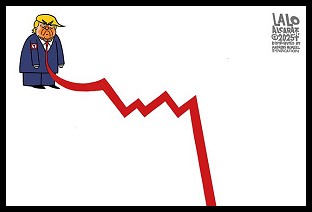 A deal announced today by Ohio's Secretary of State may help avoid some of the legal nightmares that plagued the Buckeye State's 2014 elections. While the legal settlement [PDF] restores some of the early voting access Republicans have been attempted, for years, to impose, it also leaves other rollbacks to voting reforms passed after the state's 2004 Presidential nightmare in place.
A deal announced today by Ohio's Secretary of State may help avoid some of the legal nightmares that plagued the Buckeye State's 2014 elections. While the legal settlement [PDF] restores some of the early voting access Republicans have been attempted, for years, to impose, it also leaves other rollbacks to voting reforms passed after the state's 2004 Presidential nightmare in place.
MSNBC's Zach Roth explains the agreement between Ohio's Republican Sec. of State and the ACLU, which had sued on behalf of the Ohio NAACP and League of Women Voters last year to block new GOP cuts to polling place access:
Both sides hailed the new agreement --- hopefully ending a years-long, roller-coaster legal battle --- as a victory for voters, though Roth added on Twitter that the deal, overall, seemed to be more of a victory for the GOP than for voting rights advocates. Elections expert Daniel Smith is a bit more optimistic about it today, noting that it's "a much bigger deal to have extended hours" and Sunday "Souls to the Polls" voting restored, even as the ACLU, for its part, concedes the settlement is "far from perfect"...
As Roth explains:
In February 2014, Ohio's Republican-controlled legislature passed a law that eliminated the week of same-day registration. Known as "Golden Week," it had been established after all-day lines at the polls in 2004 made Ohio the poster child for voting problems. Soon afterward, Husted followed up by eliminating all Sunday voting, which had the effect of ending the "Souls to the Polls" drives that many black churches undertake. Husted also required that weekday voting end at 5 p.m.
In the 2012 election, 157,000 Ohioans --- disproportionately minorities --- voted on the days that were cut.
...
Specifically, the agreement adds a Sunday of early voting, from 1 p.m. to 5 p.m., for presidential elections. That means that next fall there will be a total of two Sundays of early voting, since a district court judge last year reinstated voting on the Sunday directly before the election.
The deal also extends weekday voting hours during the final week of primary and general elections by two hours, until 7 p.m. Evening hours are especially useful for people who work low-wage jobs and often have trouble taking time off to get to the polls. And the agreement adds a Saturday of early voting --- something some but not all counties had previously offered.
Last year, the attempted cuts to voting access passed by the Buckeye State's Republican legislature, signed by its Republican Governor and enforced by its Republican Sec. of State, faced a roller coaster battle in the federal courts.
As Roth mentions, the history of the fight stretches back for years. After the Republican Sec. of State J. Kenneth Blackwell oversaw (many would say caused) impossibly long lines at Ohio polling places during the 2004 Presidential race, largely in Democratic-leaning areas (the last vote was cast around 3am on Wednesday morning at Kenyon College that year), the state legislature instituted early voting and other reforms which eased access to the polls on Election Day, including one week in which voters could both register and vote. That became known as "Golden Week". Those reforms helped voters a great deal and, in 2008, few had problems voting in Ohio under the state's then Democratic Sec. of State Jennifer Brunner.
Once Republicans retook the statehouse and the Secretary of State's office, they began rolling back the post-2004 reforms, but were repeatedly blocked on many of them by the federal courts in 2012 and again in 2014.
The 6th Circuit U.S. Court of Appeals upheld the lower District Court ruling that overturned the Republican attempts to roll back early voting in 2014, finding the new GOP scheme that truncated early voting hours by nixing evening voting hours during the week, on Sundays and during "Golden Week" was in violation of both the U.S. Constitution and the Voting Rights Act.
Despite those rulings by both the District and Appellate courts, the U.S. Supreme Court, in a 5 to 4 decision, overrode both at the last minute before the 2014 elections, issuing a stay to the lower court orders under the premise that the court rulings were issued too close to the election to change the existing rules.
That temporary SCOTUS decision sent the matter back to Ohio to be litigated this year, and today's announced settlement is the latest --- if not the last --- result of the ACLU's initial lawsuit hoping to stop the state Republicans' attempt to make it more difficult for all voters in the Buckeye State to participate in their own democratic elections.
(Snail mail support to "Brad Friedman, 7095 Hollywood Blvd., #594 Los Angeles, CA 90028" always welcome too!)
|


 Sunday 'Zero Day' Toons
Sunday 'Zero Day' Toons Soc. Sec. Expert Warns DOGE Hastening Collapse, Privati-zation: 'BradCast' 4/10/2025
Soc. Sec. Expert Warns DOGE Hastening Collapse, Privati-zation: 'BradCast' 4/10/2025 'Green News Report' 4/10/25
'Green News Report' 4/10/25
 Trump Blinks, Chaos Reigns, Markets Spike as Many Tariffs Remain Despite 90-Day 'Pause': 'BradCast' 4/9/25
Trump Blinks, Chaos Reigns, Markets Spike as Many Tariffs Remain Despite 90-Day 'Pause': 'BradCast' 4/9/25 SCOTUS Deportation Ruling Grimmer Than First Appears: 'BradCast' 4/8/25
SCOTUS Deportation Ruling Grimmer Than First Appears: 'BradCast' 4/8/25 'Green News Report' 4/8/25
'Green News Report' 4/8/25 Cliff Diving with Donald: 'BradCast' 4/7/25
Cliff Diving with Donald: 'BradCast' 4/7/25 Sunday 'Don't Look Down' Toons
Sunday 'Don't Look Down' Toons 'Green News Report' 4/3/25
'Green News Report' 4/3/25 'Mob Boss' Trump's Trade Sanctions Tank U.S., World Markets: 'BradCast' 4/3/25
'Mob Boss' Trump's Trade Sanctions Tank U.S., World Markets: 'BradCast' 4/3/25 Crawford Landslide in WI; Booker Makes History in U.S. Senate: 'BradCast' 4/2/25
Crawford Landslide in WI; Booker Makes History in U.S. Senate: 'BradCast' 4/2/25 Judge Ends Challenge to GA's Unverifiable, Insecure Vote System: 'BradCast' 4/1/25
Judge Ends Challenge to GA's Unverifiable, Insecure Vote System: 'BradCast' 4/1/25 Bad Court, Election News for Trump is Good News for U.S.: 'BradCast' 3/31
Bad Court, Election News for Trump is Good News for U.S.: 'BradCast' 3/31 Vets Push Back at Plan to Slash Health Care, 80K V.A. Jobs: 'BradCast' 3/27/25
Vets Push Back at Plan to Slash Health Care, 80K V.A. Jobs: 'BradCast' 3/27/25 Signal Scandal Worsens for Trump, GOP; Big Dem Election Wins in PA: 'BradCast' 3/26
Signal Scandal Worsens for Trump, GOP; Big Dem Election Wins in PA: 'BradCast' 3/26 'Emptywheel': Trump NatSec Team Should 'Resign in Disgrace': 'BradCast' 3/25/25
'Emptywheel': Trump NatSec Team Should 'Resign in Disgrace': 'BradCast' 3/25/25 USPS 'Belongs to the People, Not the Billionaires': 'BradCast' 3/24/25
USPS 'Belongs to the People, Not the Billionaires': 'BradCast' 3/24/25
 VA GOP VOTER REG FRAUDSTER OFF HOOK
VA GOP VOTER REG FRAUDSTER OFF HOOK Criminal GOP Voter Registration Fraud Probe Expanding in VA
Criminal GOP Voter Registration Fraud Probe Expanding in VA DOJ PROBE SOUGHT AFTER VA ARREST
DOJ PROBE SOUGHT AFTER VA ARREST Arrest in VA: GOP Voter Reg Scandal Widens
Arrest in VA: GOP Voter Reg Scandal Widens ALL TOGETHER: ROVE, SPROUL, KOCHS, RNC
ALL TOGETHER: ROVE, SPROUL, KOCHS, RNC LATimes: RNC's 'Fired' Sproul Working for Repubs in 'as Many as 30 States'
LATimes: RNC's 'Fired' Sproul Working for Repubs in 'as Many as 30 States' 'Fired' Sproul Group 'Cloned', Still Working for Republicans in At Least 10 States
'Fired' Sproul Group 'Cloned', Still Working for Republicans in At Least 10 States FINALLY: FOX ON GOP REG FRAUD SCANDAL
FINALLY: FOX ON GOP REG FRAUD SCANDAL COLORADO FOLLOWS FLORIDA WITH GOP CRIMINAL INVESTIGATION
COLORADO FOLLOWS FLORIDA WITH GOP CRIMINAL INVESTIGATION CRIMINAL PROBE LAUNCHED INTO GOP VOTER REGISTRATION FRAUD SCANDAL IN FL
CRIMINAL PROBE LAUNCHED INTO GOP VOTER REGISTRATION FRAUD SCANDAL IN FL Brad Breaks PA Photo ID & GOP Registration Fraud Scandal News on Hartmann TV
Brad Breaks PA Photo ID & GOP Registration Fraud Scandal News on Hartmann TV  CAUGHT ON TAPE: COORDINATED NATIONWIDE GOP VOTER REG SCAM
CAUGHT ON TAPE: COORDINATED NATIONWIDE GOP VOTER REG SCAM CRIMINAL ELECTION FRAUD COMPLAINT FILED AGAINST GOP 'FRAUD' FIRM
CRIMINAL ELECTION FRAUD COMPLAINT FILED AGAINST GOP 'FRAUD' FIRM RICK SCOTT GETS ROLLED IN GOP REGISTRATION FRAUD SCANDAL
RICK SCOTT GETS ROLLED IN GOP REGISTRATION FRAUD SCANDAL VIDEO: Brad Breaks GOP Reg Fraud Scandal on Hartmann TV
VIDEO: Brad Breaks GOP Reg Fraud Scandal on Hartmann TV RNC FIRES NATIONAL VOTER REGISTRATION FIRM FOR FRAUD
RNC FIRES NATIONAL VOTER REGISTRATION FIRM FOR FRAUD EXCLUSIVE: Intvw w/ FL Official Who First Discovered GOP Reg Fraud
EXCLUSIVE: Intvw w/ FL Official Who First Discovered GOP Reg Fraud GOP REGISTRATION FRAUD FOUND IN FL
GOP REGISTRATION FRAUD FOUND IN FL


































